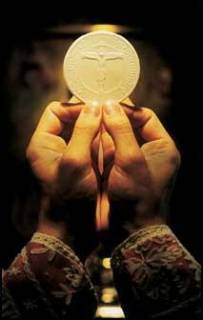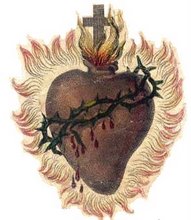Ash Wednesday: Mourning our Fallen Humanity
I wanted to write something on Ash Wednesday, about Ash Wednesday. I preached yesterday on the days of Lent, and how we are not simply walking with Christ towards His death on that Good Friday afternoon, but allowing Him to accomapany us on our journey towards death as well. The ashes imposed on our foreheads are the remanent of something dead, something that once was that no longer is.
Our bodies too will return to that state, mixing again with the dust of the earth from which the first of our race was created. We will stand before God in judgement with simply our soul, marked with His indeliable seal given us in Baptism. We will either kneel in adoration and ask for His mercy (and be sure of receiving it), or we will turn from His glory, seeking to hide ourself from Him who knows and sees all.
How do we know which path we choose? By looking at the path we have walked thus far. We were told that, (ontological change aside,) the man we were the day before ordination to the priesthood, is the man we would be the day after ordination to the priesthood. The person you are the day before your wedding will be the person you are the day after.
In the same way, the person you are the day before you die will, most likely, be the person you are the day after you die. Have you served God in every moment? Have you followed His commandments? Have you loved Him as He made you to love Him? Or, have you declined His invitation to grace and holiness time and time again? Have you rejected the unique help He offers through His Church and her Sacraments? Have you broken the commandments without a second thought to going to Him for forgiveness? Have you loved Him as you wanted instead of as He made you to love Him; or very honestly, have you loved Him at all?
If we refuse to kneel before God asking Him mercy in life, we will not kneel before Him asking for His mercy in Judgement. And this is the paradox: those who kneel are invited to stand with Him in the Father's house sharing in the Father's glory for all eternity. Those who refuse to kneel for a moment of penance before the Lord find that they kneel for all eternity under the weight of their pride, lust, greed, anger, envy, gluttony and sloth.
As Chesterton said while dying, "the issue is now clear, it is between light and darkness and everyone must choose their side." Ash Wednesday reminds us of exactly who we are: sinners in need of a savior, sinners who will die and stand before the Lord in Judgement, and sinners that God loved so much He sent His only Son to die for.
We are all making our way either to Heaven or to Hell, and Lent provides us with the reminder that we can change course. We can drop all the burdens of our life, the sins we have accumulated, the garbage we hold in our hands in order to reach out and take the one gift God wants to give us: joy, peace, and life with Him forever in Heaven. We can serve God, and find the happiness that He offers, the happiness that only He can give, the happiness that we are made for.
The below article is taken from the Catholic Education resource center, and a very good reflection on our fallen human condition and the need for universal mourning.
God love you
************
DAVID WARREN
Only forty non-shopping days to Easter, one recalls, on this, the most solemn fast of the Christian year, except Good Friday. The thought being: What would happen to the economy if, by some miracle of repentance, all the descendants of Christians were suddenly recalled to faith?
This is the flip side of an argument I have often made in conversation, when learning of millions of dollars of receipts from some gross horrible vicious obscene and cynical product, often as not from the entertainment industry. “We never thought the collapse of Western civilization would be good for the economy.” It would be dishonest to continue repeating this remark: for by now, the thought is perfectly familiar.
Familiar, and of course, bitter in the mouth, as befits Ash Wednesday.
Since Saturday, I have been intending to write about a passing event, of no great significance to the history of the world. A friend said I should use it to grab people's attention. It was the latest successful suicide bombing in Iraq — “successful,” in the sense that a hundred people were killed, enough to earn mention in the world press. Bombs went off in two crowded markets, scattering heads and limbs all over the stalls. What made this any different from the standard Islamist atrocity in New York, Madrid, Bali, London, Kabul, Jerusalem, Baghdad, or anywhere? Certainly not the final total of corpses, or the number of mutilated survivors (more than twice that hundred).
I have a list before me of confirmed Islamist terror attacks since 9/11/01, in Iraq and all over the world. More than ten thousand of them. In Iraq, the number peaked at 478 bombings in 2005 — an understatement, because multiple bombings in a single approximate location were counted as one event. With point-form brevity, the list goes on like a telephone directory.
Two bombs went off, last Friday morning in Baghdad. The first was at the al-Ghazil pet market, the second, 20 minutes later, at the bird market in New Baghdad. Friday is the Muslim holiday, and with people in Iraq feeling, lately, much more secure, these markets were crowded. They are, according to one of my Iraqi correspondents, especially popular among the poor, who take their children to look at the animals. And indeed, part of the confusion after the large explosions was sorting through the remains to distinguish parts of the children, from parts of their mothers and fathers and aunts, from parts of the animals.
Still, nothing special in that, for the Koran-reciting zealots choose the defenceless by preference, not only in Iraq but all over the world. It is so much easier to kill defenceless people — as psychopaths of non-Muslim persuasion realize, even when hitting campuses and shopping malls in North America. For the big death tolls are invariably achieved at locations where guns have been publicly banned, and they know they'll have the leisure to continue the massacre until armed police finally arrive. (That is why crime rates suddenly climb wherever “gun control” triumphs.)
Not that any armed affiliate of the NRA could have prevented what happened last Friday in Baghdad. For the bombs were concealed on the persons of two exceptionally innocent-looking ladies.
Both were Down's Syndrome. Quite obviously, they did not know what they were carrying, or why. They were detonated by remote control, using cellphones. The detached head of one of these ladies was among the first of the body parts that Baghdad police were able to identify.
Down's people can be extremely suggestible. They are like children, in many respects, and especially, trusting like small children, even as adults. As the father of a Down's child myself, I can tell you just how innocent they are, and how loving. God made them without guile, and utterly in need of our protection. And in return for that demand upon our decency (Down's children in Canada today are usually aborted), He made them a light in this world. O Lord.
My friend, who told me to write about this, is himself a man with long experience working for people with mental disabilities. He told me I had to write about this case, because it was the final abomination. He said, “we should have an international day of mourning.” He said, “I give up my membership in the human race if these Al Qaeda terrorists are human.”
Yet the truth is, that the use of the mentally disabled to carry explosives — and of children, too — is a standard Islamist practice in Iraq, Afghanistan, Israel, and elsewhere. So in this respect, too, the bombings at al-Ghazil and New Baghdad were nothing new. An even stranger truth, is that the Al Qaeda terrorists are human, like us. Like their victims. Like the two Down's ladies.
Today is an international day of mourning, and it is because we are fully human that we need to wear the ashes on our brow.
ACKNOWLEDGEMENT
David Warren. "Ash Wednesday." Ottawa Citizen (February 6, 2008). This article reprinted with permission from David Warren.
THE AUTHOR
David Warren, once editor of the Idler Magazine, is widely travelled — especially in the Middle and Far East. He has been writing for the Ottawa Citizen since 1996. His commentaries on international affairs appear Wednesdays & Saturdays; on Sundays he writes a general essay on the editorial page. Read more from David Warren at David Warren Online.Copyright © 2008 Ottawa Citizen



3 comments:
Dear Father Bill,
Maybe I have misunderstood you today. Are you saying there is no hope of conversion since who we were yesterday will be who we are tomorrow? I have a devotion to the Chaplet of Divine Mercy which I say with the intention of the conversion of souls on their deathbeds. I sthis a lost cause, then, to pray for a hardened sinner about to die that he might turn to God in his last seconds of life? Please help me out.
Liz Neville
Liz,
I did add a caveat for death bed conversions when I said, "In the same way, the person you are the day before you die will, most likely, be the person you are the day after you die." There is always accounting for miracles, and they do happen. My point was that we shouldn't bank on them. Our life is either a trajectory towards God, or away from God. There is always time to change, from ill to good, or good to ill, but, conversion aside, the way we respond to God's invitation to friendship in life is most likely the way we respond to it in death.
It's why prayers like the Divine Mercy are so important: the grace poured out onto the world by God in response to the pious prayers of good people can bring about the miracles you hope for. The death-bed conversion is necessary because without it, as I wrote, the person they were in life ends up being the person they are in death. Keep praying! Pray as well, as you do, for the sanctification and renewal of priests, that our teachings always illuminate the Truth and never distract from it.
Also, you sent me a question a while ago that I didn't respond to. Send it again, I can't find it!
Dear Father V.,
"A glance of love toward Jesus and the knowledge of our profound misery makes reparation for everything."
And...
"The tears He sheds over the wicked are wiped away by our poor, feeble efforts, by our small gift of love."
Saint Therese of The Child Jesus, of Lisieux
Yes, you are right, together let us pray unceasingly.
In Christ's Love through Mother Mary♥
Post a Comment